
The Beatles once famously sang, “I get by with a little help from my friends.” Since it was a smash-hit, you’re probably used to hearing it while you’re singing karaoke or watching a movie trailer. But there’s also a pretty substantial life lesson in there. Having and maintaining friendships is an integral part of the human experience. Unfortunately, too few people actually prioritize it as they get older. Whether it’s building a career or building a family, friendships sometimes have a way of falling by the wayside. This article takes a look at how to maintain friendships. Because if there’s one lesson Marcus always hammers home, it’s: “Surround yourself with good people,” whether that’s in business or in life.
The Importance of Friendship
In the early days of humanity, relationships were far more than just pleasant. They were crucial to our species’ survival. Israeli historian Yuval Noah Harari expands on that in his popular book “Sapiens.” He explains that relationships were important so they could weed out the bad apples in their tribe and double down on the good ones.

They needed alliances for hunting, teamwork for childcare, and people to share resources with during tough times. So, in a sense, the early humans needed friendships in order to provide for themselves. People still do a version of this today through job references, referrals, watching each other’s kids, or even through a little financial help while you’re in transition. Friends look out for each other. They help you through this thing we call life.
Friendships are also good for your health, as journalist and writer Carlin Flora details in a great book called “Friendfluence.” She explains that being with friends can lower your blood pressure, increase your chances of surviving cancer, and keep you sharp as you get older.
On the other side of the coin, having few or no friends can be actively bad for your health. She found it’s even comparable to smoking 15 cigarettes per day or being obese. In other words, having friends can actually make you live longer. An Australian study put this to the test when they followed 1,477 residents in an assisted living community. They found that “People with solid groups of friends were 22% more likely to live longer” than those with very few friends.

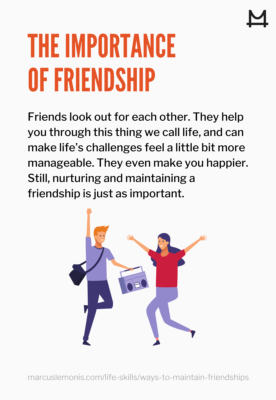
But when you think about how to maintain friendships, it’s not just about living longer. It’s also about living better. Dennis Proffitt, a professor at The University of Virginia, led a study in which he took a group of students out to the bottom of a hill and asked them to assess how difficult it would be to climb. The students who were alone thought the hill looked pretty daunting. But those who took a look at the same hill while they were among friends thought it looked fairly tame. This taught us that friends can make life’s challenges feel just a little bit more manageable. They even make you happier, as researchers from Harvard Med School and UC San Diego found that the happiness of friends is actually contagious for up to a full year.
It’s important to keep in mind that cultivating friendships takes a bit of effort. It’s like Marcus always says, “You don’t get anything. You have to earn it.” But it’s nothing to stress about. This article lays out a few easy steps for how to maintain friendships so you can live longer and stronger.
5 Ways to Maintain Friendships
1. Prioritize Facetime
You already know the importance of face-to-face meetings at work. But they’re also important when you’re thinking about how to maintain friendships. A University of Oxford study found that lack of face-to-face interaction can actually cause your personal bonds to weaken. So, that means you need to show up for your friends – literally. Sometimes a recurring structure helps, whether it’s catching a weekly football game, joining a monthly bowling league, or starting a book club.

Other times you can figure it out ad hoc, like those impromptu happy hours or taco nights. But when the day rolls around, just make sure you’re actually present. That means you’re not texting the entire time, worrying about the next day of work, or stepping out every five minutes to take a call with your babysitter. Carry yourself like it’s your priority, because as you’ve seen, it definitely should be.
And if you’re unable to see your friends in person, as many of us today are self-isolating due to Covid-19, make a point of spending virtual time together. Nowadays, friends are scheduling virtual happy hours, watching movies “together” via streaming service watch parties, and finding other creative ways to get some “face time” in with their friends.
2. Reciprocate
You’ve probably seen the quote, “relationships are a two-way street.” Maybe it was on the side of a coffee mug. Or maybe it was on a little magnet on your mom’s fridge. But it basically just means that friendships need to feel balanced.

Did your buddy drive 45 minutes to see you this time? Maybe offer to drive to their place the next time. Did they pick up the lunch check? Maybe do the same next month. Are they always reaching out to schedule the plans? Make sure you initiate it once in a while as well, or they might get the wrong idea.
The Daily Mail states that only 1 in 12 personal relationships will stand the test of time. So, make sure you stack the deck in your favor. Feel out the rhythm of your relationships and make sure they feel balanced.
3. Show Up
You might’ve met someone back in college who was a little bit flakey. Maybe you even know people like that now. Did they say they’d be somewhere, but never showed up? Did you spend $80 on concert tickets together, but when the day finally came, they changed their mind? Did they cancel plans with you because they got asked out on a date? The variations are endless, but the odds are, everyone’s been on both sides of this equation. If you’ve had your flakey moments, that’s okay. Life happens and it’s important to be flexible. But if this sort of thing happens too much, you start to seem a little unreliable and your phone stops ringing. So, make sure you take your social commitments just as seriously as your work commitments. That goes double when it’s something important. You might not be able to help move a couch every single time. But if they reach out about their 40th birthday, find a way to make it happen.

4. Respect Boundaries
Suzanne Degges-White, a professor at Northern Illinois University, explained that people raised without hugging often grow up to be non-huggers themselves. Their upbringing normalized a dynamic with less physical touch, and as adults, they’re more comfortable keeping it that way. But she went on to explain that the opposite can also be true where people raised without hugging may be starved for physical touch and actively seek it out as adults. So, the moral of the story? What’s fine for some people might make others extremely uncomfortable. So, make sure to respect it when someone says they don’t like drinking or they ask you to take off your shoes in their house.
Everyone has their own code, and when you think about how to maintain friendships, make sure to respect theirs. Further, don’t be afraid to set your own boundaries. Maybe you don’t like unsolicited advice, judgment, or when they let their dog on your bed. There’s no one-size-fits-all dynamic. The line is different with everyone, so make sure you know where it is and you’ll build friendships that last.
5. Communicate
When you know how to maintain friendships, you know how to communicate. Let’s say you run a small accounting firm and spring is your busy season. It’s important to let your friends know that you’ll be tied up for a few months, so if you turn down three invitations in a row, they won’t read into it. Other times, communication is about making people feel appreciated. If your friend took a long flight from Australia to make your birthday party, make sure you acknowledge that in some way. Maybe even buy them dinner so they don’t feel like you’re taking them for granted. Lastly, just know that communication isn’t always easy. Sometimes you’re giving or receiving feedback. It’s like Marcus has said, “People make mistakes. I know I do. It’s how you resolve them that matters.” So, once you see them making an effort to change, forgive them. It’s good for your friendship and it’s also good for you. The Mayo Clinic, one of the best hospitals in the country, explains that forgiveness can lower blood pressure, improve mental health, and reduce anxiety. So, once it’s water under the bridge, put that out there.
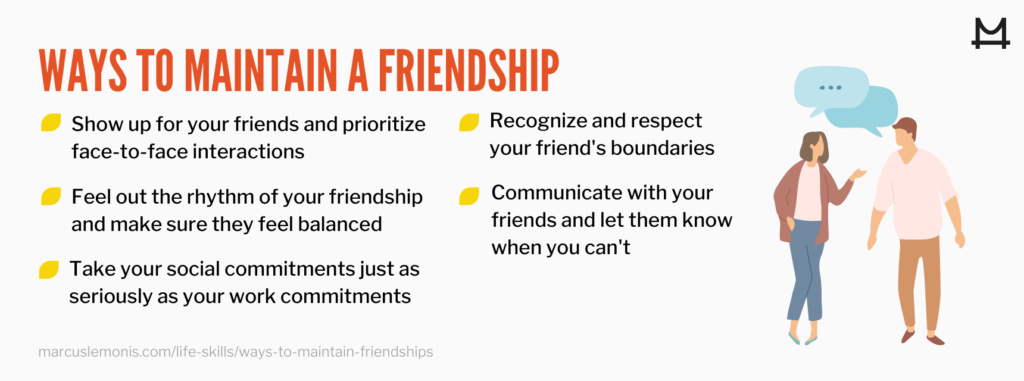
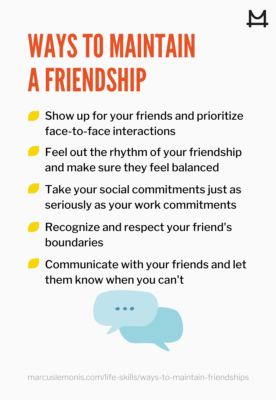
4 Tips for Growing Friendships
Marcus is famous for saying, “High performance, high reward.” And while he might’ve been talking about business, that’s still in play when it comes to how to maintain friendships. If you really put in the work, the payoff is huge. So, below are a few tips that are sure to give your personal relationships the inside track.
1. Make Counter-Offers
Let’s say someone invites you to hike this Saturday, but you have a conflict. If you say, “Sorry, can’t make it,” the conversation hits a wall and it might seem like you’re not interested. If you say, “Maybe some other time,” that could come off as vague and insincere. But if you suggest that you go on Sunday instead, that helps get something on the books, or at the very least, lets them know you’re serious about making it happen.
2. Tread Lightly with Teasing
You might know this as “roasting,” but whatever you call it, you might want to go easy on this. Some people actually do like being teased. You might even be one of those people yourself. But David Dunning, a professor of psychology at the University of Michigan, explores teasing in his book “Self Insight: Roadblocks and Detours on the Path to Knowing Thyself.” He says there’s typically a huge disconnect between how the two parties are looking at the interaction. The person doing the teasing usually sees it as playful and lighthearted. But the person receiving it might see it as “malicious and annoying.” So, be careful with this hot potato, because the juice usually isn’t worth the squeeze.

3. Audit Yourself
If you think personal relationships are a priority, make sure you’re spending your time in a way that reflects that. Go ahead and pick a time frame. Now, take a look at your calendar. How many work appointments did you have and how many of them were social? Now, scroll through your text messages. How many were for business and how many were for pleasure? Is there a similar version of this exercise when you’re thumbing through your call log? How about your email account? If you want to know how to maintain friendships, the secret is in doing the legwork. So, hold yourself accountable and make sure you’re actually doing it.
4. Be Mindful of Everyone’s Financial Situations
Everyone has a different financial situation and they’re not always comfortable talking about it. So, keep that in mind when you’re setting plans. Do they say “no” every time you invite them to Fiji? Maybe they can’t afford it. Did you give them $250 for their wedding, but they gave you $100? Maybe they’re just on a budget. Do they finally join you for dinner at a steakhouse, but say they ate before they came? They might not be able to afford dinner there. Keep in mind that the best things in life are free. File this away in the back of your mind, and if you think finances are an issue, always remember that sometimes the best nights out are just staying in.
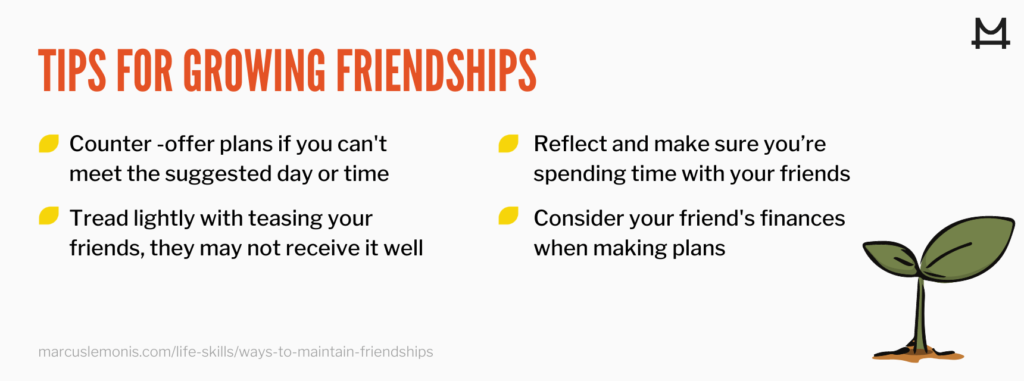
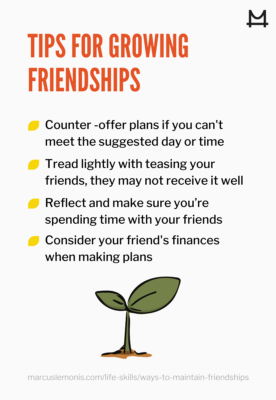
When you were a little kid, did you ever take care of a neighbor’s plants while they were on vacation? If you checked in regularly, added a little water, and did a little pruning, they grew and flourished. But if you forgot to show up, those plants were on their own, and what happened was anyone’s guess. That’s a great way to think about maintaining friendships. If you stay engaged and are really on top of things, those friendships tend to grow strong… and so do you.




